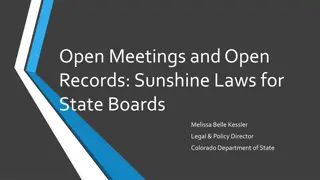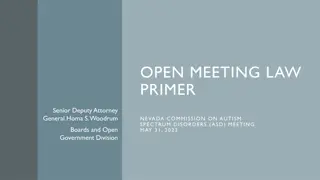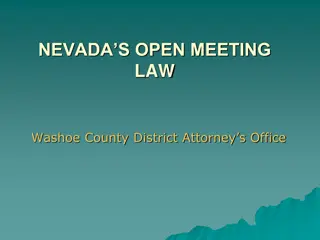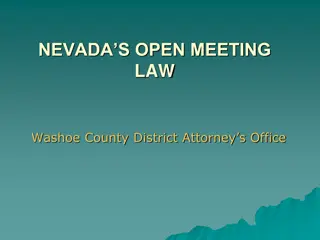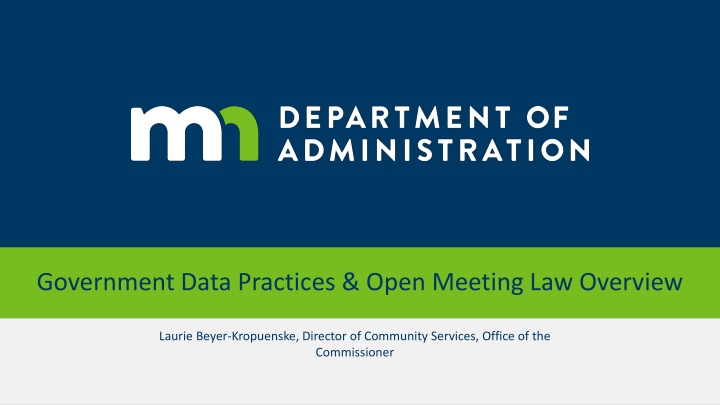
Government Data Practices and Open Meeting Laws
Learn about the importance of government data practices and open meeting laws in Minnesota. Discover how these laws promote transparency, accountability, and citizen engagement. Get insights into the Data Practices Act and other related statutes governing government data.
Download Presentation

Please find below an Image/Link to download the presentation.
The content on the website is provided AS IS for your information and personal use only. It may not be sold, licensed, or shared on other websites without obtaining consent from the author. If you encounter any issues during the download, it is possible that the publisher has removed the file from their server.
You are allowed to download the files provided on this website for personal or commercial use, subject to the condition that they are used lawfully. All files are the property of their respective owners.
The content on the website is provided AS IS for your information and personal use only. It may not be sold, licensed, or shared on other websites without obtaining consent from the author.
E N D
Presentation Transcript
Government Data Practices & Open Meeting Law Overview Laurie Beyer-Kropuenske, Director of Community Services, Office of the Commissioner
Who we are and what we do Statewide resource on Minnesota s data practices and open meeting laws Informal advice/technical assistance to government, public, media and Legislature Website, newsletters, Twitter Advisory opinions Legislative assistance Training March 2019 2
Government Data Practices Minnesota Statutes, Chapter 13
Why is government data practices so important? The Data Practices Act advances open government, accountability, and transparency The law promotes the ability of our citizens to know and gain understanding of the decisions made by their government In Minnesota, our law presumes that everything government creates as part of its official duties is public This means, for example, that your email correspondence is public, unless there is a specific state or federal law that allows you to protect it from the public March 2019 4
Government Data Practices Act (Minnesota Statutes, Ch. 13) The Data Practices Act: Defines government data Presumes government data are public Classifies certain data as not public Provides rights for the public and data subjects Requires that data on individuals are accurate, complete, current and secure Does not apply to the Legislative or Judicial branches March 2019 5
Other Data Practices Laws Official Records Act (Minnesota Statutes, section 15.17) Entities must make and preserve records that document official activities Records Management Statutes (Minnesota Statutes, section 138.17) Requires entities to keep and destroy records according to a records retention schedule March 2019 6
What are government data? Government data are: All data collected, created, received, maintained or disseminated by any government entity regardless of its physical form, storage media or conditions of use. March 2019 7
Classification of Government Data Classification Meaning of Classification Examples Public Available to anyone for any reason Government employee s name Available to: Data subject Those in the entity whose work requires access Entities authorized by law Those authorized by data subject Private/Nonpublic Social security numbers Available to: Those in the entity whose work requires access Entities authorized by law **Not available to data subject** Confidential/ Protected nonpublic Active civil or criminal investigative data
Responsible Authority, Compliance Official & Polices Your Council must appoint a Responsible Authority (RA) for data practices The RA is responsible for the collection, use and dissemination of your Council s government data The RA must appoint a Data Practices Compliance Official (DPCO) RA can serve as DPCO DPCO is responsible for day-to-day data practices duties Two required policies Responding to public data requests Data subject rights and responding to data subject requests March 2019 9
Application of Data Practices Data about you Minn. Stat. 13.601 Some are public and some are private Examples of public data include: Name Residential address Education and training background Email address or telephone number Existence/status of complaints about you Use of personal portable computing devices (laptop, iPad, smart phone, etc.) for Council duties Council-related data on these devices are government data March 2019 10
Open Meeting Law Minnesota Statutes, Chapter 13D
Key Discussion Issues Open Meeting Law When does the Open Meeting Law (OML) apply Groups subject Meetings subject Types of meetings Meeting notices Closed meetings Special considerations March 2019 12
Open Meetings With limited exceptions, all meetings of public bodies must be open to the public The public can attend open meetings Meetings subject to the law The quorum rule (Moberg v. Independent School District No. 281, 336 N.W.2d 510 (Minn. 1983).) Two parts: 1. Quorum (majority) or more of full public body, or quorum of any of the public body s committees, subcommittees, etc. and 2. Quorum (majority) discusses, decides, or receives information as a group on issues relating to its official business March 2019 13
Types of Meetings Regularly scheduled meetings Schedule of meetings on file at primary office Special meetings Any meeting not on the regular schedule 3-day advance posting on website, including date, time, place, and meeting purpose Emergency meetings Special meetings called because circumstances don t allow for a 3-day prior notice Good faith effort to notify media that requested notice March 2019 14
Types of Meetings Not Covered by the Law Meetings of less than a quorum of members Chance or social gatherings Banquets, parties, etc. Trainings No discussion of official business Advisory Opinion 16-006 Public body may meet in private facilitated discussions designed to improve trust, relationships, communications, and collaborative problem solving among members without violating OML March 2019 15
Special Considerations Use of email Avoid discussion Advisory Opinion 09-020: Public body did not comply with OML when exchanging certain email messages relating to official activities One-way communication between the chair/staff and members of a public body is permissible, such as sending meeting materials via email to all board members, with no discussion or decision-making Serial meetings Meetings of less than a quorum Avoid public meetings to fashion agreement Might be a violation March 2019 16
Closed Meetings Meetings can be closed only if required or permitted in the law All closed meetings, except those closed by attorney-client privilege, must be recorded No general personnel exception to close a meeting Statement on the record before closing a meeting Legal authority to close the meeting Describe what will be discussed Public bodies may or must close certain other meetings under the law, including as permitted by the attorney-client privilege March 2019 17
Meetings & Technology Permissible for statewide bodies to have a meeting by telephone or other electronic means Social media use Exchanges must be with the public Excludes email March 2019 18
Penalties & Remedies Intentional violation Personal liability - $300 fine Three, separate intentional violations Forfeit office Reasonable costs, disbursements, attorneys fees No reversal of public body actions taken while in violation of the law March 2019 19
Open Meetings & Data Practices Public bodies may discuss not public data Disclosure must relate to a matter within scope of authority Reasonably necessary to conduct business or agenda item before the body Data retain original classification Record of the meeting is public Recordings Record all closed meetings, except under attorney-client privilege Recordings are public with not public data removed March 2019 20
Questions? Laurie Beyer-Kropuenske laurie.beyer-Kropuenske@state.mn.us 651-201-2501 https://mn.gov/admin/data-practices/ March 2019 21

